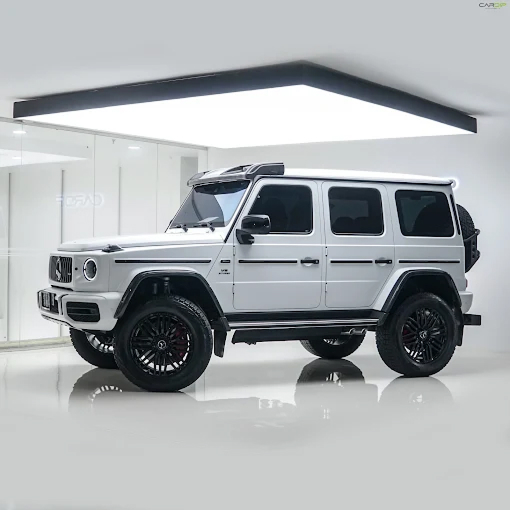If you’ve ever entered your parked car on a summer afternoon in Dubai, you know how unbearable it can get. Blistering leather seats, suffocating air, and a steering wheel too hot to touch. That leads many car owners to ask: does tint keep car cooler?
We understand this discomfort. It’s not just about comfort—it’s about protecting your health, your passengers, and your vehicle. In this article, we explain how tint works, what types perform best, and whether does tint make your car cooler in real-world use. Stay with us—we tested it, and the results are convincing.
How Does Window Tint Keep Your Car Cooler?
The Role of Solar Energy in Cabin Heat
Most of the heat inside a parked car comes from solar radiation, particularly infrared (IR) and ultraviolet (UV) rays. Standard car windows allow much of this heat to penetrate and get trapped inside, causing cabin temperatures to spike.
Window tint acts as a barrier. Depending on the material, tint can:
- Reflect a portion of IR radiation.
- Absorb sun energy and prevent it from reaching the cabin.
- Block harmful UV rays that damage surfaces and contribute to heat buildup.
Types of Tints and Their Heat-Blocking Abilities
- Dyed Window Film is the most affordable option on the market and is often chosen for its simplicity. It provides basic protection by absorbing some solar heat and reducing glare from sunlight. However, its heat rejection performance is limited, especially under Dubai’s intense summer sun, making it more of an entry-level solution for cosmetic and minimal comfort upgrades.
- Metalized Film uses a multi-layer construction that includes metallic particles designed to reflect solar heat. This type of film offers greater infrared (IR) rejection than dyed film, making it moderately effective at cooling the vehicle interior. However, it has a notable drawback—it can interfere with electronic signals, such as GPS navigation, mobile reception, and even radio frequencies, which may be a concern for modern drivers.
- Carbon Film is a step above both dyed and metalized options, particularly for those who want better heat and UV protection without affecting signal performance. It does not contain metal, so it will not disrupt electronic devices. It also features a sleek, matte finish that enhances aesthetics while maintaining durability in hot weather.
- Ceramic Film is widely considered the premium choice, especially in high-temperature regions like Dubai. It is engineered with nano-ceramic technology to block up to 90% of infrared radiation and nearly 99% of UV rays. It does not fade over time, does not interfere with electronics, and offers superior clarity and heat rejection. This makes it the ideal solution for car owners seeking the highest level of cooling performance, longevity, and comfort.
The higher the IR and UV rejection, the more significant the reduction in cabin temperature.
Additional Benefits Beyond Cooling
Here are other benefits of professional window tinting:
1. Reduced Air Conditioning Load
Your vehicle cools faster, reducing fuel consumption and wear on the AC system.
2. Enhanced Privacy
Tint obscures visibility into your car, protecting valuables.
3. Car’s Interior Preservation
Fabrics, dashboards, and leather degrade slower when protected from UV and heat.
4. Glare Reduction
Glare is reduced, which helps you drive more comfortably and confidently.
Legal Car Tint Limits in Dubai
Under UAE Federal Traffic Law No. 21 of 1995, window tinting up to 50% light transmittance is allowed for most private vehicles. However:
- Front windshields must remain clear unless factory-tinted.
- Tint must not affect visibility or impede law enforcement visibility.
CarDip ensures full compliance with UAE regulations. We provide documentation and expert guidance on legal tint percentages.
How Long Does Tint Last in Dubai’s Hot Weather?
With proper installation and high-quality material, tint can last 5 to 10 years. Factors that affect lifespan include:
- Film type (ceramic lasts longest).
- Quality of installation.
- Exposure to sand, heat, and cleaning methods.
CarDip uses premium films designed for harsh Middle Eastern climates and backs services with a warranty.
Why CarDip is Your Best Choice
We don’t just install film—we offer solutions. CarDip stands out in Dubai for:
- Certified Installers trained in modern techniques.
- Dust-free Facilities for flawless application.
- Top-Tier Tint Brands trusted in luxury automotive.
- Warranty Coverage that matches manufacturer standards.
We also help clients choose the right tint based on vehicle type, usage, and budget, ensuring performance without compromise.

Is Tinting Worth the Investment?
Consider the long-term savings:
- Up to 30% reduction in AC fuel consumption.
- Delayed wear on upholstery and electronics.
- Fewer maintenance costs on climate control.
A one-time tint investment can improve comfort daily and preserve your vehicle’s value over time.
Conclusion
So—does tint keep car cooler? Absolutely. Our testing, customer experience, and scientific data all point to the same conclusion: tinting is not just a cosmetic upgrade. It’s a functional, value-adding, and climate-smart decision—especially in Dubai.
Looking to keep your car cooler and protect your interior?
Book a consultation with CarDip and get your car windows tinded today. Our team is ready to help you choose the right tint to beat the heat—legally, safely, and effectively.
